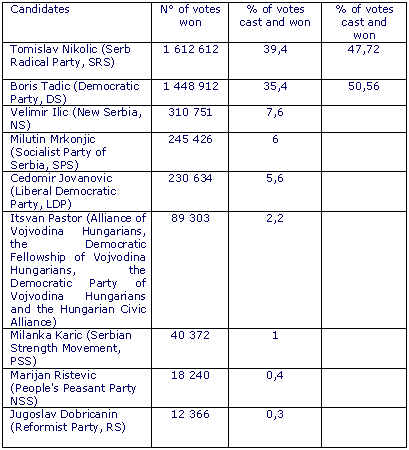Results
News
Corinne Deloy,
Fondation Robert Schuman,
Helen Levy
-

Available versions :
EN

Corinne Deloy
Fondation Robert Schuman
Helen Levy
Outgoing President of the Republic, Boris Tadic (Democratic Party DS) was re-elected as leader of Serbia winning 50.56% of the vote in comparison with 47.72% for his rival Tomislav Nikolic (Radical Party SRS). This is the third consecutive defeat for the ultra-nationalist leader in a Presidential election after the votes in 2000 and 2004. Turn out rose to 67.6% i.e. +6.6 points in comparison with the first round on 20th January last. This high turn out rate seems to have benefited the outgoing President
"The elections are over and I can tell you we won them together," declared Boris Tadic when the results were announced. "It is a victory for Serb democracy. We are a European democracy. Our country has shown Europe that it is major democracy," he added.
The European Union responded quickly to the re-election of the outgoing President that it had implicitly supported. "The Serb people has confirmed its support for their country's path towards democracy and Europe," indicated the Slovenian Presidency of the European Union.
The outgoing Head of State had qualified the second round of the presidential election as "a referendum" on Serbia's rapprochement with the European Union. "On 3rd February we shall hold a kind of referendum on the path Serbia is to take. Serbia will have to choose between moving towards progress or taking a step back into the past. A vote in favour of Tomislav Nikolic would shelve everything that has been accomplished since 2000, destroying all hope of investment and development in employment and it would take us back to a time of doubt. I expect voters to choose to continue with the reforms started in October 2000," he said.
"Boris Tadic has won, I congratulate him," declared Tomislav Nikolic who acknowledged his defeat rapidly and called for everyone "to remain calm". "We shall ask Russia to continue to help Serbia as it has done until now. And we shall ask the European Union to stop its blackmail with regard to Serbia and for it not to impose impossible conditions on us. We are ready to join the European Union but there are terms that no authority can accept," he insisted. During his entire campaign, Tomislav Nikolic defended the rapprochement between Belgrade and Moscow whom he qualifies as a strategic partner much closer and more reliable than the European Union since it is the only country that supports Serbia in its refusal to accept Kosovo's independence.
The re-elected President will firstly be confronted by the probable proclamation of Kosovo's independence by the provinces' authorities. Boris Tadic has maintained several times that he wants to dissociate the Kosovo issue from Serbia's entry into the European Union and wants the Serbs to accept the relinquishment of the province in order not to spoil the future of Serbia's relations with the European Union. The Kosovar authorities said that if Boris Tadic won they would wait a few weeks in accordance with the request made by the European Union before proclaiming their independence.
The already unstable government coalition led by Vojislav Kostunica (Democratic Party of Serbia DSS) and which apart from the DSS, includes the Democratic Party and the G17+ led by Mladjan Dinkic, emerges slightly more damaged after this presidential election even though no one has any real interest in the collapse of the government. Accusing the Head of State of not being able to relinquish any agreement with the European Union if Brussels deploys (as it intends to do shortly) a civilian mission designed to help structure independence, the Prime Minister refused to support Boris Tadic publicly in the second round of the election. After this victory, clinched without Vojislav Kostunica's aid, Boris Tadic has now become the true leader of Serbia.
Boris Tadic, who is 50 and a trained psychologist, started his political career in the 1990's by opposing the regime established by Slobodan Milosevic. After the fall of the latter in October 2000 he became Telecommunications Minister and then took over Defence. In 2004 he finally succeeded in becoming the leader of the Democratic Party after a long fight for succession to Prime Minister, Zoran Djindjic, who was assassinated on 12th March 2003. On 27th June 2004 Boris Tadic was elected President of the Republic with 53.7% of the vote against 45% for Tomislav Nikolic.
With this historic election organised just a few days from Kosovo's independence the Serbs have confirmed that they have started along a new path after Slobodan Milosevic. Just over 7 years after the fall of the dictator, when the entity of Yugoslavia finally collapsed the Serbs still have a long way to go in order to emerge from economic difficulty, to democratise their country and finally to be at peace with themselves and their neighbours.
Boris Tadic is expecting the European Union to help him convince the Serbs of the work they still have to do. President Boris Tadic has also promised his countrymen that Serbia will achieve official candidate status for accession to the European Union by the end of this year.
Reminder of the Results of the 1st and 2nd Rounds of the Presidential Election 20th January and 3rd February 2008 in Serbia
Turn out: 61% (first round) and 67.6% (second round)
 Source: Centre for free elections and democracy (CESID http://www.cesid.org)
Source: Centre for free elections and democracy (CESID http://www.cesid.org)On the same theme
To go further
Elections in Europe
Helen Levy
—
24 February 2026
Elections in Europe
Helen Levy
—
10 February 2026
Elections in Europe
Corinne Deloy
—
20 January 2026
Elections in Europe
Corinne Deloy
—
13 January 2026

The Letter
Schuman
European news of the week
Unique in its genre, with its 200,000 subscribers and its editions in 6 languages (French, English, German, Spanish, Polish and Ukrainian), it has brought to you, for 15 years, a summary of European news, more needed now than ever
Versions :


